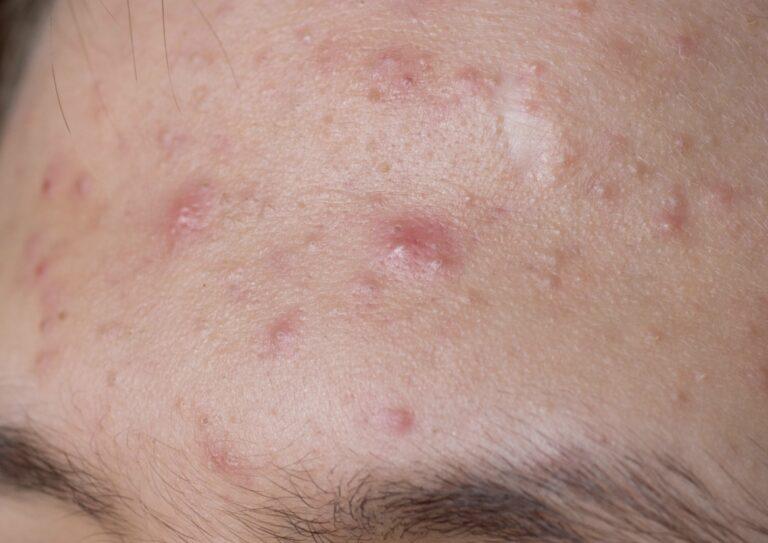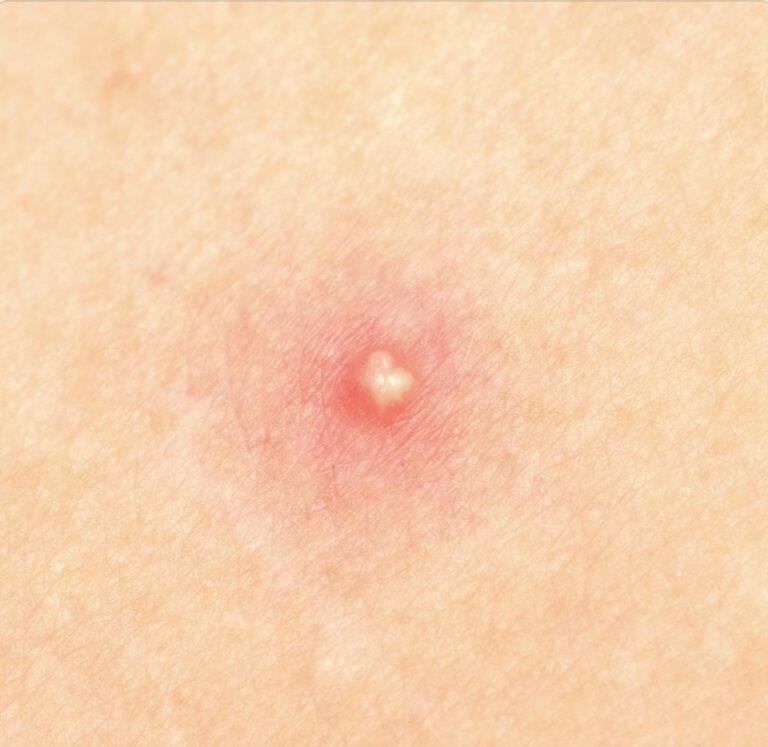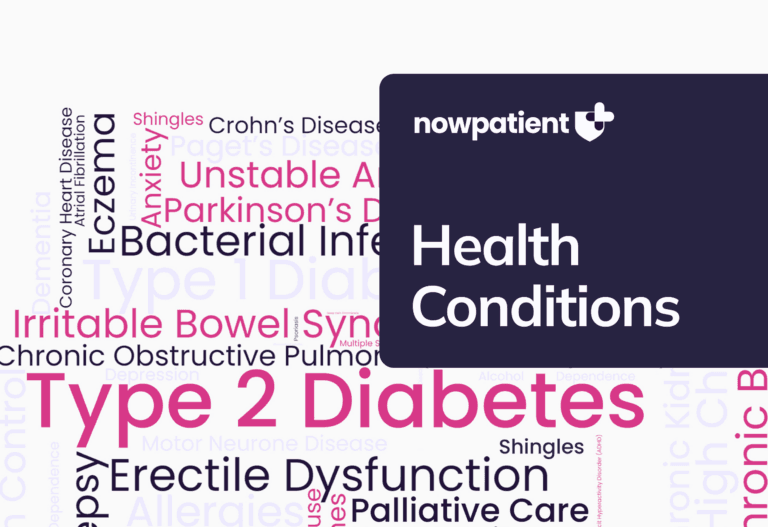So, what is the best acne treatment? And how do you find what works for you? We’re here for you. We’re going to run through some of the best acne treatments so you know which ones to try first.
What causes acne?
Acne is a skin condition that causes inflammation and pimples. Often serious and stubborn pimples. It usually affects the skin on your face, but you can get acne on other parts of your body too, like your neck, chest and back.
You get pimples when the follicles (also called pores) in your skin get blocked. This is usually by dead skin cells, oil your skin produces (sebum) and by products you put on your face. The bacteria that naturally live on your skin then feeds on whatever’s blocking your follicle, multiplying until your immune system detects the bacteria as an infection and fights back, causing inflammation and pus to form. Your follicle has now become a red, raised inflamed pimple that contains white to yellow pus. Great.
With acne you often get concentrations of pimples on areas of your skin. If the infection in the pimples spread out of the follicle, particularly if it goes deeper into your skin, your pimples can grow and become more serious turning into nodules and cysts.
What age does acne stop?
Acne is most common during the teenage years, particularly between 16 and 19 when hormone levels are fluctuating. But acne won’t necessarily disappear once you hit your twenties. Adult acne can affect you during your twenties, thirties and beyond.
Prescription acne treatments
Some of the most effective acne treatments are prescription only, meaning you’ll need to talk to a doctor and get a prescription before you can buy one. Your options include:
Retinoids
Retinoids like tretinoin are as close to a miracle ingredient as you can get for acne and skin care. They’re a substance that’s derived from vitamin A and once they’re put on your skin they convert into retinoic acid which encourages your skin cells to turn-over faster. This helps you shed old skin cells and oil. It can unblock your follicles, lessen the appearance of blemishes and scars and can even reduce inflammation – all perfect for fighting acne.
Antibiotics
Antibiotics can help kill the bacteria at the root of your acne. You can take oral antibiotics or you can be prescribed topical antibiotics that you apply directly to your skin, usually in the form of a cream.
Over the counter acne treatments
You can also buy effective acne treatments over the counter (OTC) at pharmacies without needing a prescription. Try to focus on products that contain:
Salicylic acid
Salicylic acid exfoliates your skin, removes excess oil, unclogs your follicles and can even reduce inflammation. It’s a common ingredient in acne products. You’ll be able to find it in a range of creams, lotions and cleansers.
Benzoyl peroxide
This is another common acne-fighting ingredient you can find in a lot of OTC acne products. Benzoyl peroxide kills the bacteria that causes acne and it can reduce inflammation too. However, it can dry skin out and cause irritation, so use it with caution at first, particularly if you have sensitive skin.
Retinol
Like the prescription retinoids we mentioned above retinol is also a type of vitamin A derivative that is converted to retinoic acid when they come into contact with your skin. They have a similar effect to retinoids but aren’t as strong, as they don’t result in as much retinoic acid. You can find retinol in lots of OTC products, like creams and serums.
Cosmetic acne treatments
Cosmetic acne treatments are treatments given by a trained professional, usually a dermatologist. Seeing a dermatologist is generally a great idea if you have acne, as they can provide expert and impartial advice tailored to your needs and circumstances.
So, what do dermatologists prescribe for acne? They may offer you a range of cosmetic treatments, including:
- Chemical peels that can exfoliate your skin, remove dead skin cells and oil, clear your follicles and reduce the appearance of marks and scars
- Dermabrasion to remove dead skin, unclog your pores, encourage the growth of new skin cells and reduce the appearance of marks and scars
- Laser therapy that can kill bacteria, stimulate the growth of new skin cells, reduce inflammation and reduce the appearance of scars and blemishes
Natural acne treatments
There’s little to no evidence behind natural treatments for acne, but there are plenty of people who claim they work for them. We’ve listed some of the most popular below. You may find they work for you or not. But often they’re cheap and risk-free, so they’re worth a shot. You can try:
- Applying apple cider vinegar to your skin
- Applying tea tree oil to your skin
- Applying witch hazel to your skin
- Moisturizing with a product that contains aloe vera. Getting more zinc in your diet either through taking a zinc supplement or eating zinc-rich foods
- Getting more omega-3 oil in your diet either through taking a supplement or eating fatty fish like salmon, mackerel or sardines
Making diet and lifestyle changes
One of the best natural ways to treat acne is to make a lifestyle change. The link between acne and food for example has long been debated, but there is evidence that some foods can make it worse.
You may see improvements in your acne if you:
- Stop eating fast food
- Cut out high glycemic foods like white bread, white rice, sugary foods and drinks, and potatoes
- Cut back on dairy products
- Exercise regularly
- Find ways to reduce stress
What is the most effective acne treatment?
There’s no single most effective acne treatment, as people react differently to them and it depends on what works best for you. Most people find prescription acne treatments are the most effective, like retinoids and antibiotics.
What is the fastest way to get rid of acne?
There’s no best way to get rid of acne, but there are plenty of products that can help as well as following a daily skin cleansing and care routine. You can try prescription treatments that contain retinoids and antibiotics and over the counter products that contain retinol, salicylic acid and benzyl peroxide. You can try natural remedies too, like apple cider vinegar and tea tree oil. Experiment to find what works best for you.
Acne treatment myths
Toothpaste helps clear acne
This is an old myth as stubborn as acne itself. It’s usually claimed that toothpaste dries pimples out and that it has antibacterial properties. There’s no evidence that it dries pimples. And whilst toothpaste is antibacterial, it’s also not proven to kill the bacteria behind your acne. Toothpaste can also irritate your skin, so it’s best to steer clear and stick to proven acne treatments.
Popping your pimples can help clear them up faster
Please don’t pop your pimples, particularly the larger ones that press deeper into your skin. Although it can be satisfying, popping your pimples can make the infection much worse. It can push pus and bacteria deeper into your skin and you can get further infections from bacteria on your fingers. You also make it more likely your acne will cause scars.
What acne treatment is right for me?
Everyone is different and people respond in different ways to acne treatments – what may be a miracle cure for one person may do nothing for you. Your best course of action is to experiment. You can try a range of acne treatments and try a combination of them to find what’s best for your skin. Many people find prescription acne treatments like tretinoin to be effective. If you’d like to try this you can order directly NowPatient.
Sources
Medical Disclaimer
NowPatient has taken all reasonable steps to ensure that all material is factually accurate, complete, and current. However, the knowledge and experience of a qualified healthcare professional should always be sought after instead of using the information on this page. Before taking any drug, you should always speak to your doctor or another qualified healthcare provider.
The information provided here about medications is subject to change and is not meant to include all uses, precautions, warnings, directions, drug interactions, allergic reactions, or negative effects. The absence of warnings or other information for a particular medication does not imply that the medication or medication combination is appropriate for all patients or for all possible purposes.











